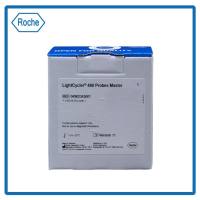This chapter deals with the use of synthetic oligonucleotides as probes for the detection of allelic sequence variation and point mutations by use of a dot-blot procedure in DNA enzymatically amplified in vitro (polymerase chain reaction). The approach is based on the principle that a fully matched hybrid formed between the target sequence and an oligonucleotide probe is thermally more stable than a single base-pair (bp) mismatch hybrid. The differential hybridization under stringent conditions of short, radioactively labeled oligonucleotide probes was first introduced in the late 1970s, and is a powerful diagnostic tool (1 ). However, because of the complexity of human genomic DNA and inefficiencies in hybridization that are inherent in short oligonucleotide probes, microgram quantities of sample DNA, gel electrophoresis, and highly radioactive DNA probes were required. Recently, a modification of this approach has been described that uses the polymerase chain reaction (PCR) to selectively amplify the DNA region of interest (2 ). As a result of this substantial reduction in complexity, a simplified “dot-blot” detection format is possible that requires only nanogram amounts of sample DNA and moderately radioactive probes.






